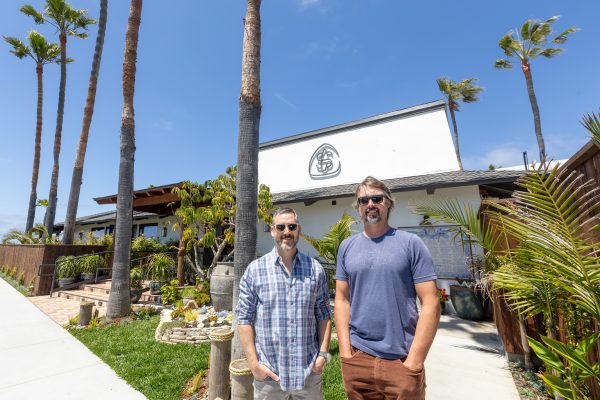
This wasn’t the curtain call anyone had in mind.
The City of Redondo Beach on Monday severed its relationship with the Civic Light Opera of the South Bay Cities, essentially evicting the homegrown theater company that played a key role in transforming the former Aviation High School gymnasium into a state-of-the-art facility now known as the Redondo Beach Performing Arts Center.
Mayor Mike Gin said the city had little choice after CLO fell behind $209,000 in rent, dating back to its fall 2010 series.
“This is not a decision we have taken lightly at all,” Gin said. “I personally am a season ticket holder, and have been for a number of years, to the CLO. They have contributed a lot to our community. But at this point, the CLO is ten months in arrears on payment for their use of the Center for the season beginning last fall.”
City Manager Bill Workman said the city intends to collect the CLO’s debt by whatever means it must.
“The council is reviewing its options as to pursuing $209,000 for payment to the city,” Workman said. “We are not writing it off our books.”
James Blackman, the founder, executive director and producer of the Civic Light Opera, did not return calls seeking comment for this article. He did, however, announce the postponement of the upcoming production of Stephen Sondheim’s “Company” on the CLO website last week. The production, originally scheduled to begin Sept. 14, was suspended indefinitely.
But Blackman vowed that the show would eventually go on and hinted at big changes in the works.
“Civic Light Opera of South Bay Cities will proudly continue to provide exceptional theatrical productions to our audiences, just as we have for the past 20 years,” Blackman said in the statement, released Aug. 25. “We are in active negotiations on very significant growth and expansion opportunities for our organization. I expect to be able to announce new dates for ‘Company,’ as well as other exciting news in the very near future.”
In a recent interview with the Easy Reader, Blackman indicated that the CLO was on the cusp of changing its business operation to a more sponsorship-driven model, relying more on large donors to bolster revenue heretofore reliant on ticket sales. He also told the Daily Breeze this week that the CLO would soon announce a new venue, new sponsors, and the launch of a performing arts teaching academy.
Blackman’s statement last week also indicated that the CLO, which is a non-profit, was about to expand. He said current ticketholders would have their existing tickets honored at whatever show they wished to see.
“As we grow our organization to the next level, we appreciate the patience of our subscribers and patrons,” Blackman said. “It is due to their loyal support for the legacy of this beloved cultural arts institution that we will be able to surpass former levels of success and continue to deliver the award-winning Broadway caliber performances that we have been privileged to provide since 1991.”
The kid from Aviation
Whatever Blackman’s future plans are, however, they cannot include the Redondo Beach Performing Arts Center. Workman stated unequivocally that the relationship between the city and CLO has been “terminated.”
Blackman’s relationship with the facility, located at the corner of Aviation and Manhattan Beach boulevards, predates his founding of the company in 1991. He grew up on Inglewood Avenue in Lawndale. As a 6’6” high school freshman whose ebullient personality was even more outsized then his height, he was kindly instructed by a Lawndale High School teacher to walk down the street to Aviation High.
He found a home there. At Aviation High, Blackman fell under the tutelage of drama teacher Larry Boyd and fell in love with theater. While he was there, the school constructed its auditorium.
“I remember when there was no lid on the theatre and the moon was coming in, we used to have barbeques,” he said in a 2003 interview. “It was just all concrete. We used to steal keys and sneak in at 1 a.m., but not to be vandals. There used to be 40 or 50 kids in there — and this says a lot about the quality of the community — there was no drinking or carousing, nothing bad. We spent all night long running up on stage and accepting awards. That was my playground. That was the place I grew up in.”
Blackman graduated in 1973. He didn’t go to college, but worked a string of jobs that included a legendary run as a waiter at The Kettle in Manhattan Beach and, later, a stint with the Reagan administration restoring the USS Sequoia Presidential Yacht to service. But he never really stopped playing the stage at Aviation. He later recalled sitting in the White House prior to his interview and thinking about Aviation, calming himself with the thought that after performing in front of 1,000 people he could surely handle one person.
Blackman returned to California and worked with a civic light opera in Santa Barbara, where he hatched the crazy notion that a similar venture might work in the South Bay. His former high school had closed its doors in 1982 due to declining enrollment. A referendum movement in 1984 stymied a commercial development and the city instead signed a 99-year, $1 dollar lease and made the high school and the 11 acres surrounding it a performing arts center and a park.

When Blackman returned and founded the CLO in 1991, it was a decidedly ramshackle affair. The roof leaked, the area was suffering its worst economic downturn in decades, and the fledgling theatrical company struggled month-to-month to pay its bills. But somehow, Blackman was able to survive and ultimately thrive, establishing the company as one of the premiere practitioners of musical theater in the region. The CLO repeatedly beat out much more established and well-funded companies to win coveted Ovation awards and developed a devoted local following.
The CLO’s success fired the imagination of city officials. In the late 1990s, then assistant city manager Sue Armstrong saw the popularity of the CLO and another RBPAC tenant – the Distinguished Speakers Series – and began investigating how other cities operated performing arts centers. The city created a new master plan for the center and the surrounding park and cobbled together nearly $14 million in an assortment of grants, redevelopment money, and other funds to rebuild the facilities.
The grand re-opening in early 2003 seemed like a fairytale ending. Blackman emceed a red-carpet event that featured his childhood hero, theater star Carol Channing, as the city unveiled its sparkling new Performing Arts Center. Armstrong publically credited the CLO and the Distinguished Speakers series for making the day possible.
“Those two things alone became very prestigious,” said Armstrong. “I give them tremendous credit, because they created a constituency for the place.”
Blackman was at a rare loss for words on that night, at times blinking back tears.
“That program they had at Aviation shaped me for the rest of my life and gave me real skills to get a job and make something of myself,” Blackman said in an interview that week. “Nor did I have the ability to get a college education, so I had to function on what I took from Aviation. To find out my destiny would be to return to that building…It gives hope that our lives have some reason, and are not just random facts. There seems to be a pattern. It’s a very, very wild and emotionally cool thing. I got to come home and build an artistic institution. Who knew the city would follow the spirit of it? It’s an amazing story. If I could throw a disease in there, we could be on Oprah.”
Eviction
According to city officials, obtaining rent from the CLO had become increasingly difficult in recent years. The company was chronically in arrears but always managed to catch up. The CLO produced four shows each year, each running throughout three weekends. The city charged $55,000 per show.
Gin said the last payment the city received was in February 2010. It was for $10,000.
“We have not received any additional payment since then,” Gin said. “Normally for tenants at the Performing Arts Center, we require the collection of fees upfront. However, we have always been very flexible and lenient with the CLO, just based on our longstanding relationship we have had and the fact they have always eventually paid their bills. Particularly in the last few years they have always been late. But never this late – usually they have paid in full by June.”
Blackman told the Breeze that this economic downturn had severely hurt the theater company’s attendance numbers. He also said that the CLO fully intends to pay the city what it owes when its new arrangements are solidified.
The city, meanwhile, has made the facility available immediately to other potential users.
“To minimize revenue loss, the dates reserved in September and December shows for this particular season have been released and made available to other users for other private performances,” Gin said.
Performing Arts Centers run by cities typically run at a loss. According to Workman, the city has managed to reduce its subsidy for the RBPAC over the last five years from $800,000 annually to about $300,000. The city manager said that because of the CLO’s revered status in the community, the city rented to the company somewhat below market value. By way of example, he noted that CNN is hosting its Freedom Awards at the facility early next year for more than $30,000 over only three days.
Workman said the city has taken a “more businesslike” approach to the operation of the center, and noted that the facility has slowly gained a reputation that has begun to attract more prospective renters.
“I think one or two years from now, after this bump in the road, we may be financially in better shape with the Performing Arts Center,” Workman said. “The CLO actually did not pay a standard daily rate because it was sort of the featured event at the Performing Arts Center…..The slots the CLO had were also prime times – Friday, Saturday, and Sunday – so if there is a silver lining we can now book prime time versus middle of the week type programming.”
Councilman Steve Diels did not rule out the CLO returning, although possibly not at the same lease terms.
“It’s a tough position to be in for the city because we do support the arts and the Performing Arts Center, as well,” Diels said. “But the most important thing for the arts is to keep the Performing Arts Center functioning. I would like to think that the Civic Light Opera can get its finances in order, and they certainly would be welcome back. There are no hard feelings. It’s just at some point we need to get the place funded.”
Gin emphasized the difficulty of evicting such a longstanding and cherished tenant. But he said in light of the fact that every city employee has taken pay cuts to balance the city’s budget for the last three years, elected officials could not continue to let this situation stand.
“We are asking huge sacrifices of all our employees, asking all our city family to come together and balance those budgets,” Gin said. “So for us to not make the effort to collect this money, and really respect the terms of the contractual agreement…It was something we just needed to do.” ER










